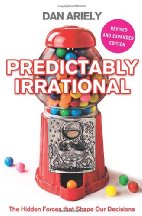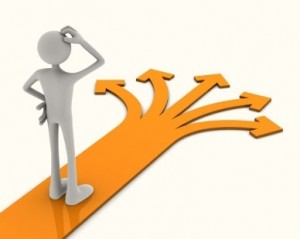
When you make a decision, what influences you?
You might expect that your past experiences would have an impact – and they certainly do – but are you sufficiently aware of the other factors influencing your decision-making process? From who orders first in a round of drinks to which new TV we buy, we’re constantly being nudged towards decisions without understanding the impact of those nudges. If we took better control of our decision making, could we make better decisions? Dan Ariely believes so, and in ‘Predictably Irrational’ he sets out to prove it.
What’s it about?
Ariely argues that conventional economics is based on the flawed assumption that human beings make rational decisions. Ouch. Instead, he insists that human beings consistently make irrational decisions which do not take key factors into account. However, rather than seeing this as fundamentally frightening, Ariely suggests that if we can recognise our irrationalities and find ways to coerce or encourage ourselves into more sensible behaviour, we will be able to leave behind our self destructive habits and build more supportive communities.
Behavioural economics is a relatively new field which explores how people’s actual behaviour (rather than how we assume rational individuals would behave) affects their decision making in multiple arenas. Using a mixture of anecdotes and research studies conducted primarily with professors from MIT, Ariely unpicks our assumptions in a range of arenas, describes how we really respond to various situations and explores ways of using this improved understanding to improve our lives as individuals and as a society.
Thesis: we do not make rational decisions, even though we think we do. Nevertheless, our decisions – including wrong ones – are predictably irrational. If we can learn to understand the true reasons behind our decision-making, we may be able to learn from our mistakes.
What’s it like?
Surprisingly intuitive. Consistently interesting. Ariely begins by deconstructing traditional economic explanations of how the stock market works, moves swiftly on the the idea that we always operate by comparison (allowing companies to manipulate us by creating ‘decoys’ in a list of three options) and then explores the concept of ‘achoring’ (which explains why everyone is horrified by the rising price of fuel but fails to appreciate how expensive the latest ‘superfood’ is). He tackles the fallacy of supply and demand, the power of FREE, and the difficulties created by moving from social to economic norms.
All of this is handled smoothly with explanations that are easy to understand and studies that are well explained. These range from the trivial (will your beer order be influenced by the person ordering before you?) to the very serious (will you really perform better if you are promised the possibility of a stupidly large bonus?) There are amusing facts and deeply concerning findings, especially when he examines the shocking effects on our honesty of replacing money with any form of token system (as bankers do).
What’s to like?
Although much of what Ariely uncovers goes against what ‘traditional’ economics suggests, his discoveries are consistently convincing and certainly meshed with many of my own experiences. (I know I don’t really want eight yoghurts; I want four. But because it’s BOGOF I will get eight yoghurts…and probably throw four away because I don’t eat that much yoghurt. Such is the power of FREE.)

http://www.savagechickens.com/2005/05/irrational-fear-4.html
I found the chapter on making choices particularly resonated with me. I am terrible at making decisions. The more options I’m given, the greater my paralysis, and it turns out I’m not alone. (Being semi-vegan makes ordering from restaurant menus a lot easier because instead of skimming through countless deliciously described options, I’m hunting for an option I might be able to amend to suit my needs. Ironically, this is often far quicker, even allowing for browsing allergen menus and discussing subtractions and substitutions with waiting staff, than attempting to narrow down options on a genuine list of options.) Ariely makes an excellent point that I am going to try to remember in future: instead of desperately trying to retain and consider all our options, we need to consider what we’re losing out on by not choosing.
Instead of desperately trying to retain and consider all our options, we need to consider what we’re losing out on by not choosing.
This is broadly applicable in a range of contexts: if you spend 10 minutes deciding what to eat (only to order something you don’t enjoy anyway because you were influenced by your companions’ choices!) then you’ve lost valuable time you could spend actually conversing with your companions; if you spend three months comparing broadly similiar mobile phones, you’ve missed out on three months’ worth of enjoyment of a new phone; and if you spend weeks trying to find time to find the best home for your excess stuff then you might find yourself, many months later, still buried under that stuff. *shoves a teetering heap of stuff away from the keyboard*
What can I do?
So far, so sensible. But here’s what ought to be the best bit: armed with our new knowledge, Ariely suggests some solutions. To avoid falling into the relativity ‘trap’ he suggests only ever comparing what you have already decided you can afford, such as only viewing online or visiting houses you can buy. This, experience tells me, is an excellent idea. I tend to start browsing hotels for family holidays without setting any kind of budget (then look vaguely perplexed when my husband splutters at the proposed cost) and gradually realise that my dreams may be exceeding reality, but as Ariely points out, once you’ve looked, you can’t un-look, so it’s better to use the filters that exist to help you Not Look.

Narrowing down our options before looking can help.
Ultimately, it seems like many of the larger solutions involve those who govern us listening to the lessons learned by behavioural economists rather than acting according to traditional Common Sense and hoping it’ll automatically come with a side order of Self Control. Ariely has a few interesting suggestions, particularly related to finance (of course) and healthcare, but being decidedly non-expert in those fields myself, I can’t comment on their viability, and, shockingly, it seems that banks in particular don’t necessarily want their credit cards to actually save their customers money…
Mostly, Ariely is seeking to make us more effective at setting our own limits, and there are some useful suggestions, though most do actually fall under the category of Common Sense.
Final thoughts
This is an interesting read and, in places, raises deeply concerning issues (especially in the chapter on arousal and sexual ethics) that, clearly, policy makers and individuals should be thinking differently about. The author is Israeli but lives in America and, accordingly, his perspective is anchored in American values, but most of this discussion is still relevant to British attitudes and social policy.
The notes and bibliography make clear that this is a well researched and referenced book, which is how it usually feels, but the dips into personal anecdote can make the whole feel slightly less convincing. For instance, the chapter on arousal had some very valid and concerning points to make about sex (which were supported by research), but made less sense when discussing life choices, which was partly based on his and his wife’s decision-making (whether or not you ultimately opt for an epidural, you can think about it rationally beforehand, and I refuse to believe that sticking your hands in icy water for two minutes is in any way comparable to childbirth*).
This won’t please advocates of genuine in-the-moment self-control, but it’s an excellent book to get you analysing your own decision making. Now if only someone could persaude all the bankers and politicians to read it.
‘Predictably Irrational’,
Dan Ariely,
2009, Harper, paperback
*I will readily admit that, assuming my memory serves me correctly, I have never deliberately stuck my hands in icy water for two minutes, but I have given birth to two children, which I think makes me slightly more informed than Ariely, who, to the best of my knowledge, has done neither.